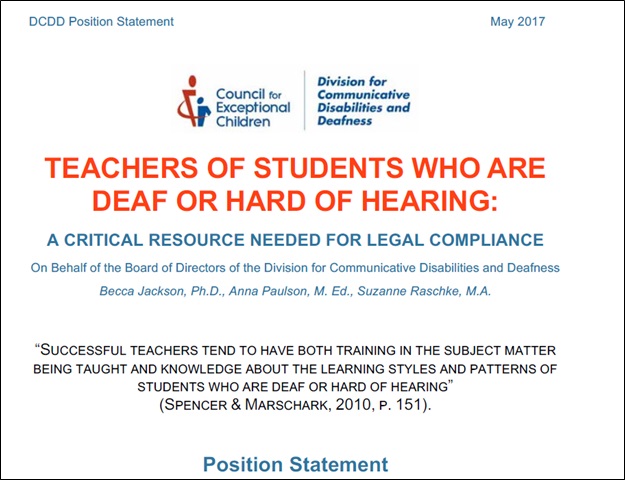
Advocacy Notes:
My Supervisor says I can’t advocate for my students!
 Hearing loss/deafness is a low incidence disability that requires specialists in the field to assess, plan and provide appropriate instructional programs. Yet, in some schools, the DHH specialist is told they cannot advocate for their students. This is primarily due to resistance to funding the extra costs to providing appropriate supports and services to students with hearing loss.
Hearing loss/deafness is a low incidence disability that requires specialists in the field to assess, plan and provide appropriate instructional programs. Yet, in some schools, the DHH specialist is told they cannot advocate for their students. This is primarily due to resistance to funding the extra costs to providing appropriate supports and services to students with hearing loss.
While it is very understandable for schools to be seriously concerned about budget limitations, the determination of a student’s free and appropriate public education (FAPE) must be based on individual needs as stated in the IEP and may not be based on the location of staff, on the funds that are available, or on the convenience of the school district. Under IDEA, lack of adequate personnel or resources does not relieve school districts of their obligations to make FAPE available to each disabled student in the least restrictive educational setting in which his or her IEP can be implemented. Exclusion of a student from an appropriate placement based solely on the student’s disability is prohibited by Section 504 of the Rehabilitation Act of 1973.
 The scenario of advocating for more DHH instructional time, captioning, interpreter services etc. and then being told that this advocacy will no longer be tolerated during team meetings or in discussions with parents is familiar to many teachers of the deaf/hard of hearing and educational audiologists. Continuing to advocate can sometimes end up with the teacher being considered insubordinate.
The scenario of advocating for more DHH instructional time, captioning, interpreter services etc. and then being told that this advocacy will no longer be tolerated during team meetings or in discussions with parents is familiar to many teachers of the deaf/hard of hearing and educational audiologists. Continuing to advocate can sometimes end up with the teacher being considered insubordinate.
Is it legal for a school to totally restrict a teacher’s ability to advocate for student needs? There are two court cases that deal with this question: that are worth consideration:
- Fales v. Garst(8th Cir. 2001) Three special ed teachers filed suit against principal who tried to block them from advocating for students. The case revolved around free speech versus employer’s rights. The teachers alleged that the principal had violated their rights to freedom of speech and association under the First Amendment by instructing them not to discuss incidents regarding special education students at their middle school and their rights to equal protection under the Fourteenth Amendment by lowering their evaluations. The court believed that speech “which centered around the proper care and education of special education students, touched upon matters of public concern.” Thus, the teachers’ speech would seem to be “constitutionally protected expression.” However, the Court noted that, “the court balances the teacher’s interest in speaking against her employer’s interest in promoting the efficiency of the public service it performs through its employees.
In pdf Complaint Analysis by Wrightslaw
- Settlegoode v. Portland Public Schools, (9th Cir 2004) The court upheld the jury verdict and reinstated a-1 million-dollar award to a special ed teacher who was retaliated against and fired for advocating for her students. Per the Court: “Teachers are uniquely situated to know whether students are receiving the type of attention and education that they deserve and, in this case, are federally entitled to. We have long recognized the importance of allowing teachers to speak out on school matters because teachers are, as a class, the members of a community most likely to have informed and definite opinions. This is particularly so with respect to disabled children, who may not be able to communicate effectively that they lack appropriate facilities. Teachers may therefore be the only guardians of these children’s rights and interests during the school day.” The decision further clarifies freedom of speech for teachers.
Decision in pdf Complaint
As employees, it is understood that we all want to comply with what our administrators require. Yet, very few professionals fully understand the impact of hearing loss and deafness on educational performance, and the components of supports and services that may be necessary for students to fully access and benefit from the general education curriculum. The 2017 Division for Communicative Disabilities and Deafness Position Statement from the Council for Exceptional Children eloquently describes the role of the DHH professional as a critical resource needed for legal compliance. If you experience unusual resistance to your professional opinions about what is required for a student to receive FAPE, it is suggested that you share this Position Statement with your administrator, and if necessary, information about the two relevant court cases as a means to substantiate your important role in defining the appropriate individual educational program of students who are deaf or hard of hearing.

